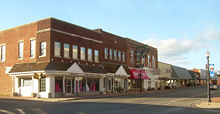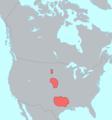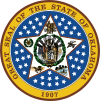The Oklahoma Portal Oklahoma (/ˌoʊkləˈhoʊmə/ ⓘ OHK-lə-HOH-mə; Choctaw: Oklahumma, pronounced [oklahómma]; Cherokee: ᎣᎧᎳᎰᎹ, Okalahoma, pronounced [ògàlàhǒːmã́]) is a landlocked state in the South Central region of the United States. It borders Texas to the south and west, Kansas to the north, Missouri to the northeast, Arkansas to the east, New Mexico to the west, and Colorado to the northwest. Partially in the western extreme of the Upland South, it is the 20th-most extensive and the 28th-most populous of the 50 United States. Its residents are known as Oklahomans and its capital and largest city is Oklahoma City. The state's name is derived from the Choctaw words okla, 'people' and humma, which translates as 'red'. Oklahoma is also known informally by its nickname, "The Sooner State", in reference to the Sooners, settlers who staked their claims in formerly American Indian-owned lands until the Indian Appropriations Act of 1889 authorized the Land Rush of 1889 opening the land to white settlement. With ancient mountain ranges, prairie, mesas, and eastern forests, most of Oklahoma lies in the Great Plains, Cross Timbers, and the U.S. Interior Highlands, all regions prone to severe weather. Oklahoma is at a confluence of three major American cultural regions. Historically, it served as a government-sanctioned territory for American Indians moved from east of the Mississippi River, a route for cattle drives from Texas and related regions, and a destination for Southern settlers. There are currently 26 spoken in Oklahoma. According to the 2020 U.S. census, 14.2 percent of Oklahomans identify as American Indians, the highest indigenous population by percentage in any state. A major producer of natural gas, oil, and agricultural products, Oklahoma relies on an economic base of aviation, energy, telecommunications, and biotechnology. Oklahoma City and Tulsa serve as Oklahoma's primary economic anchors, with nearly two-thirds of Oklahomans living within their metropolitan statistical areas. (Full article...) Selected article -The Outsiders is a coming-of-age novel by S.E. Hinton published in 1967 by Viking Press. The book details the conflict between two rival gangs of White Americans divided by their socioeconomic status: the working-class "Greasers" and the upper-middle-class "Socs" (pronounced /ˈsoʊʃɪz/—short for Socials). The story is told in first-person perspective by teenage protagonist Ponyboy Curtis, and takes place in Tulsa, Oklahoma in 1965, although this is never explicitly stated in the book. Hinton began writing the novel when she was 15 and wrote the bulk of it when she was 16 and a junior in high school. She was 18 when the book was published. She released the work using her initials rather than her feminine given names (Susan Eloise) so that her gender would not lead male book reviewers to dismiss the work. (Full article...)Spotlight city -Tahlequah (/ˈtæləkwɑː/ TAL-ə-kwah; Cherokee: ᏓᎵᏆ, daligwa [dàlígʷá]) is a city in Cherokee County, Oklahoma located at the foothills of the Ozark Mountains. It is part of the Green Country region of Oklahoma and was established as a capital of the 19th-century Cherokee Nation in 1839, as part of the new settlement in Indian Territory after the Cherokee Native Americans were forced west from the American Southeast on the Trail of Tears. The city's population was 15,753 at the 2010 census, an increase of 8.96 percent over the figure of 14,458 reported in 2000. The 2019 estimated population is 16,819. (Full article...)Selected pictureFeatured content
Featured lists: Oklahoma birds • Tallest buildings in Tulsa • List of tallest buildings in Oklahoma City • List of birds of Oklahoma • List of Oklahoma Sooners football seasons • List of Oklahoma Sooners head football coaches • List of Oklahoma Sooners in the NFL Draft State facts
State symbols
Selected biography -William Penn Adair Rogers (November 4, 1879 – August 15, 1935) was an American vaudeville performer, actor, and humorous social commentator. He was born as a citizen of the Cherokee Nation, in the Indian Territory (now part of Oklahoma), and is known as "Oklahoma's Favorite Son". As an entertainer and humorist, he traveled around the world three times, made 71 films (50 silent films and 21 "talkies"), and wrote more than 4,000 nationally syndicated newspaper columns. By the mid-1930s, Rogers was hugely popular in the United States for his leading political wit and was the highest paid of Hollywood film stars. He died in 1935 with aviator Wiley Post when their small airplane crashed in northern Alaska. Rogers began his career as a performer on vaudeville. His rope act led to success in the Ziegfeld Follies, which in turn led to the first of his many movie contracts. His 1920s syndicated newspaper column and his radio appearances increased his visibility and popularity. Rogers crusaded for aviation expansion and provided Americans with first-hand accounts of his world travels. His earthy anecdotes and folksy style allowed him to poke fun at gangsters, prohibition, politicians, government programs, and a host of other controversial topics in a way that found general acclaim from a national audience with no one offended. His aphorisms, couched in humorous terms, were widely quoted, for example, "I am not a member of an organized political party. I am a Democrat." (Full article...)Did you know -
General images -The following are images from various Oklahoma-related articles on Wikipedia.
Related portalsWikiprojects
Things you can do
Oklahoma topicsCategoriesNew articlesThis list was generated from these rules. Questions and feedback are always welcome! The search is being run daily with the most recent ~14 days of results. Note: Some articles may not be relevant to this project.
Rules | Match log | Results page (for watching) | Last updated: 2024-05-01 21:29 (UTC) Note: The list display can now be customized by each user. See List display personalization for details.
Associated WikimediaThe following Wikimedia Foundation sister projects provide more on this subject:
Discover Wikipedia using portals
|

Sons of Union Veterans of the Civil War





![Image 1Cartoonist's rendering of Theodore Roosevelt's initial reaction to the Oklahoma Constitution.[needs context] (from History of Oklahoma)](https://upload.wikimedia.org/wikipedia/en/thumb/2/28/Teddyrooseveltoklahomaconstitution.png/120px-Teddyrooseveltoklahomaconstitution.png)
















































